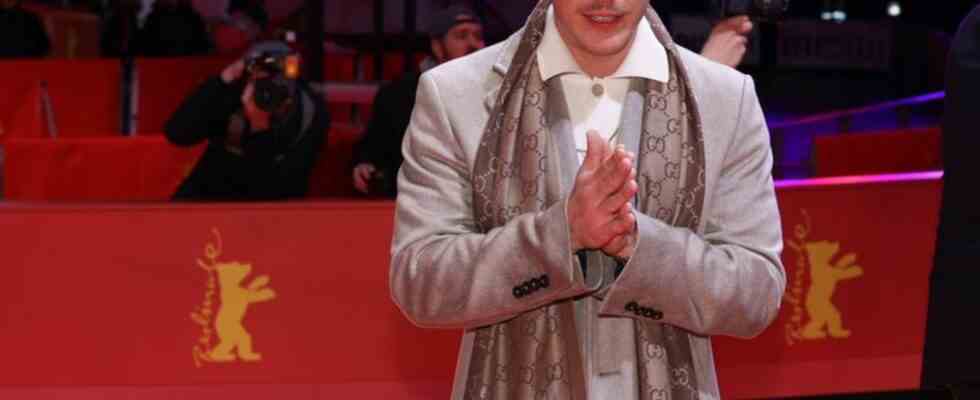World premiere at Berlinale
“Sonne und Beton” – novel by Felix Lobrecht filmed
When filming his book of the same name, it was important to comedian Felix Lobrecht that the dialogues are authentic. photo
© Jörg Carstensen/dpa
Many people know his podcast: comedian Felix Lobrecht grew up in Berlin’s Gropiusstadt and tells about it in the novel “Sonne und Beton”. The film is now in cinemas.
“Man, are you serious? Let me in now, dude. I’ve been at this fucking school for four years.” Lukas stands in front of the building, but the security guards won’t let him on the premises because he forgot his ID. So he plays hooky and soon gets into a fight that will have fatal consequences. Felix Lobrecht’s novel “Sonne und Beton” begins with this scene. It’s the story of four boys growing up in the south of Berlin, in Gropiusstadt in Neukölln.
With the novel, Lobrecht landed a bestseller. Now the story is coming to the cinema. The film recently celebrated its world premiere at the Berlinale. Lobrecht appeared at the press conference with training pants, a gold watch and a film crew. David Wnendt (“Wetlands”, “He’s Back”) directed the project.
Movie brings back the 2000s
And one thing can be said: the film bangs properly. He brings back the early 2000s with Cherry Coke, push-button telephone and recordings from the time of then-Chancellor Gerhard Schröder. As in the book, Lukas stands in vain in front of his school, then meets other boys and is beaten up by guys in the park. Sentences like: “Have you looked in the mirror? Your whole face is fucked up.”
In around two hours, the film takes you to broken families and aimless men, to high-rise canyons and backroom deals, to friendly and less friendly people. The film has a great cast with four young actors. And “Tatort” actor Jörg Hartmann plays Lukas’ father Matthias, who is happy to soon be able to work as a janitor at the university, likes to read the newspaper and often says: “The smarter ones give in.”
Lukas’ older brother thinks that’s a less helpful sentence and instead lives by the motto “The smarter ones follow”. At some point Lukas and the boys come up with the idea of breaking into the school and stealing the new computers. “Sun and Concrete” is a social panorama that makes you think about social justice and the question of how violence becomes independent.
Several offers for book adaptation
Lobrecht is best known as a podcast moderator (“Gemischtes Hack”) and as a comedian. The 34-year-old is now so successful that even the “New York Times” wrote about him. There were several offers to film his book. The heavyweights had significantly more money than they offered, said producer Fabian Gasmia at the Berlinale.
Lobrecht, however, decided on their offer because he had the feeling that the most uncompromising film would be made of it there. Lobrecht confirmed that and said he felt they were the closest they got to understanding what the book was really about.
In the film it was important to him to find actors who understood the vibe, Lobrecht told the German Press Agency on the sidelines of the Berlinale. That the dialogues didn’t feel like in German films, but that you hit the language. “It was very important to me that it was authentic.”
Anyone who googles Lobrecht’s name will find countless interviews with him – from nonsense talks about breasts, in which he rather lets the comedian hang out, to political talks about role allocation and equal opportunities with Olaf Scholz on the podcast “Machiavelli” by Cosmo. Here the reflected, thoughtful Felix Lobrecht comes to the fore.
Criticism for joke about monkeys in Krefeld Zoo
He often makes fun of political correctness on his shows. Now and then he gets criticism. For example, when he made a joke in 2020 about monkeys in the Krefeld zoo that died in a fire, there was a great outcry on the internet. “People wear Wokeness like an accessory right now,” he said two years ago in the “Hotel Matze” podcast. And these are mainly rich children from small towns, which makes it very elitist.
What always astonishes him: We live in a “very awake, i.e. woken time”, where a wide variety of discrimination mechanisms and dimensions are being dealt with and this important, largest and best researched dimension of discrimination – namely social in the sense of economic origin – is simply not an issue , he said on SRF. Nothing determines a life more than social background.

